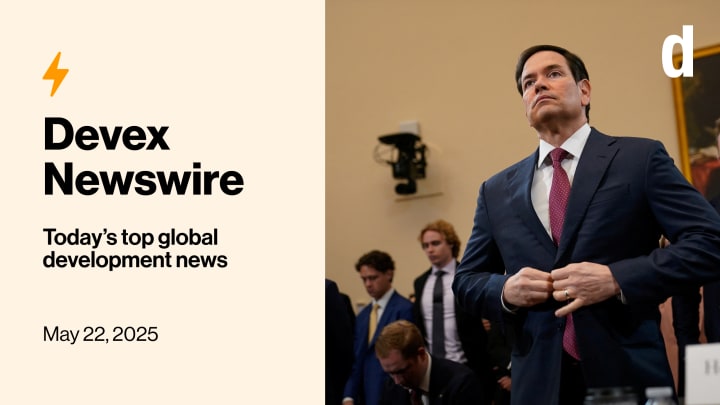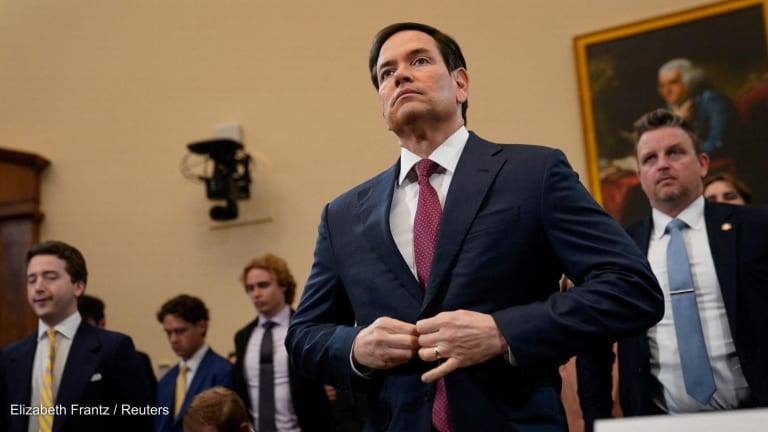
Marco Rubio, the U.S. secretary of state, insisted yesterday that “no one had died” as a result of the Trump administration’s sweeping foreign aid cuts. Public health experts, aid workers, and the parents of children who have died disagree.
Also in today’s edition: Countries are vying to help the United Nations cut down on real estate costs, and Brazil is circulating a climate change adaptation plan for health.
+ Speaking of global health, the Devex team is at the World Health Assembly in Geneva today moderating a series of panels and conversations with high profile officials from WHO, the Pandemic Fund, and the Gates Foundation. Tune in here — or sign up to attend if you’re at WHA.
Not just a river in Egypt
“No children are dying on my watch,” Rubio told the U.S. House Foreign Affairs Committee yesterday.
This is a preview of Newswire
Sign up to this newsletter for an inside look at the biggest stories in global development, in your inbox daily.
It’s an assertion that reveals just how much is at stake in the Trump administration’s shock reorganization of U.S. foreign aid programs over the last four months.
In a whirlwind of congressional hearings this week, Rubio repeatedly insisted that U.S. foreign aid will be more effective and better aligned with U.S. foreign policy while USAID is dismantled, the vast majority of its staff face termination, and some of the agency’s largest implementing partners stare down collapse.
But, my colleague Elissa Miolene reports, some of the most tense — and telling — exchanges in Rubio’s return to Capitol Hill revolved around the basic question of whether the global disruption of U.S. foreign assistance programs — of which Rubio is now the acting head — has cost lives.
Rep. Brad Sherman, a Democrat from California, displayed posters of individuals who have reportedly died because of disrupted services — which Rubio labeled “false.”
One showed Pe Kha Lau, a woman in Myanmar who died after a State Department stop-work order forced the International Rescue Committee-supported clinic she relied on to close in late January. Lau was sent home — and she passed away four days later.
The second showed Evan Anzoo, a 5-year-old from South Sudan, who lost access to lifesaving HIV medications after the Trump administration halted the President’s Emergency Plan for AIDS Relief, or PEPFAR, in February, and, along with his mother, died soon after, according to The New York Times.
“That’s a lie,” said Rubio, dismissing Sherman’s questions. “False.”
“I think people don’t want to believe that the policy decisions they’re making, or the funding decisions they’re making, have real-life human implications,” says the leader of a humanitarian agency, who requested to speak anonymously to protect their organization.
“I think it’s really critical that we come to terms with the fact they do.”
Read: ‘No children are dying on my watch,’ says Rubio
ICYMI: Death, reform, and power — Rubio spars with Senate over USAID cuts
See also: Marco Rubio — what part is he actually playing in USAID's dismantling?
The rent is too damn high
Geneva and New York City are expensive places to set up shop — especially when your shop is the United Nations, and you are experiencing an existential funding crunch due to cuts by the U.S. government and other major donors.
With that harsh reality in mind, U.N. leaders might entertain offers for more affordable headquarters locations — and some governments are jumping at the chance to pitch them, my colleague Colum Lynch reports.
While the U.N. has no immediate plans to seek greener (cheaper) pastures, “a financial retrenchment by the United States and other traditional donors from global institutions is setting the stage for the relocation of back-office work to less expensive cities,” Colum writes.
That’s where Rwanda, Austria, Kenya, Germany, Turkey, and Qatar, and other potential U.N. suitors are hoping they might fit the bill.
“The Government of Rwanda is prepared to offer office facilities and essential services, while actively partnering on the development of a long-term UN Campus in the heart of the City of Kigali,” Rwandan Prime Minister Édouard Ngirente wrote in a private May 15 letter to U.N. Secretary-General António Guterres, which Colum got a hold of.
The German government, for its part, would be very happy for the U.N. to expand its presence in Bonn, and might even consider covering the costs of relocating staff from New York or Geneva.
Read: Have I got a deal for you — UN in search of cheap housing
A new prescription
As Brazil gears up to host the 30th U.N. Climate Change Conference, or COP30, later this year, the country is keeping a focus on the health impacts of climate change — and what to do about them.
My colleague Sara Jerving reports from the World Health Assembly in Geneva that Brazilian officials are currently drafting an action plan for climate change adaptation in the health sector that will be presented to countries at COP30 in November.
Sara got a sneak peak of the details of the current draft, which aims to offer countries a set of evidence-based, cost-effective adaptation actions they can take in the face of changing disease dynamics, environmental health impacts, and other stressors at the intersection of health and climate.
Read: Brazil is crafting an action plan on climate and health ahead of COP30
Further reading: Climate finance for health — ‘Woefully short, woefully slow’ (Pro)
+ Looking for a deeper dive into the major issues facing global development with unrivaled analysis of the funding landscape, timely roundtables with sector leaders and policymakers, as well as tailored and insightful career resources and insider tidbits? Get these and more when you sign up for a Devex Pro membership. We offer a 15-day free trial.
The sun also rises
Speaking of the World Health Assembly, it’s no secret that this year’s gathering is taking place under some threatening skies.
Frozen aid and budget cuts to vital programs have added to the immense strain on health workers. Institutions such as the World Health Organization and UNAIDS, meanwhile, are grappling with financial pressures that in turn impact millions around the world. But my colleagues in Geneva also report there is momentum behind a global health rethink.
Watch: The next era of global health
Listen: Live from WHA78 — a look at the Pandemic Agreement
Related: Who’s funding the World Health Organization? (Pro)
+ To get up-to-date insider information on the panels and decisions at WHA78, sign up for Devex CheckUp, our weekly global health newsletter — and get today’s edition in your inbox soon!
A farewell to schools
Was the Education World Forum the last hurrah for the U.K.’s Foreign, Commonwealth & Development Office as a leading financier of global education?
The sense of irony that the British government was hosting the forum, the world’s largest annual gathering of education and skills ministers, this week was not lost on delegates. The forum is billed as an opportunity for attendees to transform global education through meaningful conversations. But just days before the opening reception, the U.K.’s minister of state for international development, Jenny Chapman, stated FCDO was set to deprioritize education, amid plans to slash U.K. aid spending to 0.3% of national income.
The mood at the forum was “gloomy,” one delegate tells Devex contributor Gabriella Jóźwiak. He took comfort only in the fact that countries reliant on education aid were now united against a common problem — aid cuts — and trying to find a solution together.
At a sideline event last night, education ministers from seven African nations described how investing in children’s education was fundamental to their countries’ future economic success. While the ministers acknowledged they would need to take more responsibility for delivering education, and proposed solutions to the funding cuts including innovation and public-private partnerships, some were vocal about feeling abandoned.
“We feel as if all the partners have gunned up to … withdraw support at a time when we are building momentum and scaling up what works,” said Malawi’s Education Minister Madalitso Wirima Kambauwa.
FCDO Head of Girls' Education Judith Herbertson had the difficult gig of responding. “Please be assured we are listening,” she said.
Many ministers directed thanks to Herbertson for everything FCDO had done to date to help. Gabriella tells me that it felt like they were saying goodbye — or at least “see you later,” since some still hold out hope that FCDO could change its decision.
In other news
The U.S. State Department’s Bureau of Population, Refugees and Migration will take over responding to overseas disasters from USAID, despite concerns about its lack of expertise and resources. [Reuters]
South Africa’s finance minister says his country does not have the money to make up for the $430 million gap left by the Trump administration aid cuts. [AP]
A new bill seeks to update Brazil’s permitting process, but environmentalists caution against changes that could dismantle key protections and pose threats to people and the climate. [Bloomberg]
Sign up to Newswire for an inside look at the biggest stories in global development.




